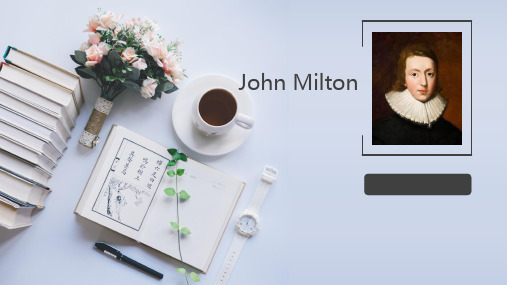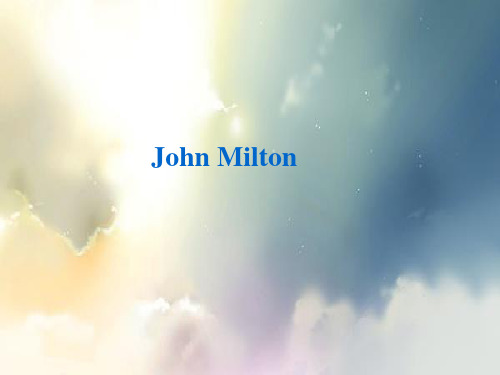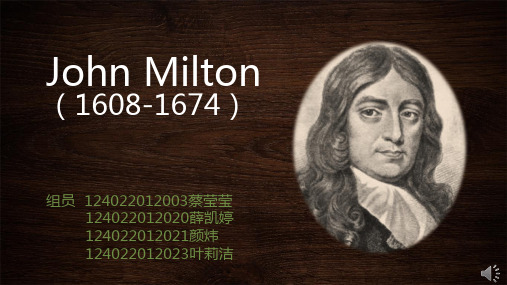John Milton
- 格式:ppt
- 大小:1.82 MB
- 文档页数:25



john milton的英文简介约翰·弥尔顿,英国诗人、政论家,民主斗士,英国文学史上伟大的六大诗人之一。
下面是小编给大家整理的john milton的英文简介,供大家参阅!john milton简介John Milton (December 9, 1608 to November 8, 1674) British poet, political commentator, democratic fighter, British literature in the history of one of the great six poets. Representative works are long poem "Lost Paradise", "Fu Paradise" and "Lux" Samson.In 1625, Milton went to Cambridge University and began writing poetry. After graduating from college and studying literature for 6 years. In 1638, Milton traveled to Europe. In 1640 the British Revolution broke out, Milton decided to join in the revolutionary movement, and published five books on religious freedom, in 1644, Milton also for freedom of speech and wrote "on the freedom of the press." In 1649, after the victory of the British colonies, Milton published "on the king and officials of the authority" and other documents to consolidate the revolutionary regime. 1660, the British feudal dynasty restoration, Milton was arrested and imprisoned, was soon released, then he concentrate on writing poetryjohn milton人物经历On December 9, 1608, John Milton was born. Milton's father is a legal instrument, the family is more honest. Although his father was a Puritan, but not as much as the other Puritans at that time, he likes music, but also guide Milton to love music. He also loves books such as life, while the young Milton played little like his father like books. Milton's father also specifically for his hired a private teacher, Milton just over ten years old, you can write some good poetry. At that time Milton often learned late into the night, which had a very bad impact on his later body.At the age of 12, his father sent Milton to a man named St. Paul's men's school at the time of study, 15 years old entered the University of Cambridge. The young Milton faces handsome, but proud, thought independent. Milton had intended to go to the British Church as a pastor. But the conflict between the Catholics and the Puritans intensified, and Milton was a Puritan.After completing college studies, Milton gave up the idea of being a pastor in the British Church, and for some time he did not know what to do. Repeated thinking, he firmly believe that he should be born poet. He lived his father about 20 miles from London's Dunton village estate for nearly five years, andin order to better realize his own ideals in the future, he began to write poetry and study.In the past five years, he wrote a large number of short poems, including "happy people" to express a longing for a happy life, "meditation" on the thought of meditation was described, "Liesidas" praise A drowned friend, "Commas" shows a masquerade.But soon, he began to feel tired of this quiet pastoral life. He is eager to the outside world more exciting. So he took his father to his money, embarked on a journey to France, Switzerland, Italy. In Italy, he heard that the British King and the contradiction between the people imminent, and soon may be the outbreak of war. So he immediately gave up the plan to travel and write poetry, rushed back to England.After returning to London, he strongly opposed the conservative party and devoted all his energy to writing a large number of political pamphlets that supported the freedom of the people. Published in 1644, "published freedom", bold attack on the British press censorship system; published in 1649, "the destruction of idols," advocated the death of Charles I; 1650 published "to defend the British people", to meet the Republican and revolutionary arrival.In 1649, according to the parliamentary judgment, KingCharles I was beheaded, while Oliver Cromwell came to power, became the head of government, and was called "protect the country". The leaders of the Puritan government, who had written a large number of essays and pamphlets written by Milton for the victory of the Republic in the revolution, then appointed him as secretary for foreign affairs. In addition to his Latin alphabet, which is responsible for translating foreign governments, he must also answer in Latin, and he is responsible for criticizing the attacks and statements against the Cromwell government. Because of the heavy task, he had to work day and night, soon, vision began to decline, the doctor warned him to stop using the eye, otherwise he will be blind. But he refused the doctor asked him to give up the heavy reading and writing work advice, continue to work hard. Eventually, by 1652, his eyes were completely blind. Even so, he did not stop working, he used to read the way he wrote others to work day and night to continue. Soon, his wife died, gave him left three young girl waiting, the largest but also 6 years old. This is a busy business for the blind people is undoubtedly worse.Soon, the king saved the regime to regain the regime. Charles II (the son of the former king) boarded the throne. Protestants are everywhere to escape. And some went to theUnited States, and some were arrested and sentenced to death. Milton hid a friend for a few months, his property was confiscated, his book was burned by the executioner. Finally, Milton was caught in the prison, so the king later let him. Milton ended the social life, and began to poetry again, he spent seven years to write the poem "lost paradise." In this poem, he tells how Satan has betrayed God, how Eve and Adam have been expelled from Eden and so on. He was blind because of his eyes, had to read by him, and sometimes let his daughter to write, and sometimes by visiting friends to write. "Paradise" for him to win a high reputation, many scholars and politicians so far away from the road, came to visit him. After completing this masterpiece, he wrote the "Rebirth Paradise", and a drama about the Samsoni of Rex (Samson was Israel Hercules, and was as blind as Milton in his later years).November 8, 1674, Milton died.john milton创作特点Theme of the workIn his writings, Milton elaborated liberalism from the aspects of natural human rights, freedom of the press, freedom of religious belief, freedom of education, freedom of marriage and so on. Milton believes that freedom, property, life is the natural rights of people, inviolable, that people have theright to overthrow the freedom of the tyrant. He also criticized the British system of review of books published, against the practice of strangling the truth, demanding freedom of speech and publication, creating the conditions for the spread of capitalist ideology and culture. After gaining these rights, Milton further affirmed the existence of man. In the religious view, he put forward a rational belief, which is actually a Christian humanistic view of religion, requires people to have a rational, free choice, cultivate virtue, with a good individual directly with God to communicate and communicate. Milton proposed his own different from the theological, secular feudal education reform program, trying to establish a modern education system. At the same time, due to Milton's own marriage experience, he particularly advocates equality between men and women, freedom of marriage. After the failure of the revolution, Milton began the creation of three long poems, reflecting the theme of freedom in his trilogy, expressing the poet as a tenacious liberal fighter, still in the post-restoration mood Believe in the confidence of the revolution."Paradise", "Fu Paradise" and "Warrior Samson" have shown people's struggle and salvation, are touched the works of the human mind, the poet on the deepest human morality, spirit andbelief in the exploration, Milton's reflection on man and human nature, thinking about the problems of human unfortunate roots and how people can be saved. The theme of redemption is embodied in the selection of the theme of the long poem and the shaping of the characters.Artistic characteristicsThe theme of the selection, Milton "Paradise Lost" by the ancestor of Adam, Eve by Sedan lure to be deprived of the story of the park, revealing the concept of Christian "original sin" to promote human beings should be realistic attitude to bear the burden of earthly life , Save yourself with atonement. The story of the restoration of the paradise with Jesus' victory over all the temptations of Satan shows that mankind can overcome all kinds of suffering and save if he can improve his character. "Warrior Samson" by the tragic character Samson, imprisoned, blind, suffered humiliation, at the expense of revenge life experience, complained about Milton's own political experience and ideals and beliefs, praised the struggle for the noble cause Perseverance of the character and at the expense of their salvation spirit.The image of the people, Milton out of the need to express the salvation of the lofty ideals, the choice of ambitiousevents as the theme, the use of magnificent long poems as a genre to lead the classic, magnificent style, creating a literary history of the classic image: Jesus, Samson, Adam and Eve. The image of the characters with the poet on the shaping of the idea of redemption. Adam and Eve are the ancestors of mankind, who have universal qualities of mankind, the condition of salvation; Jesus is the embodiment of the poet's ideal personality, virtue is the basis of salvation; Samson is the typical image of the road to salvation, Mankind brings hope of salvation.---来源网络整理,仅供参考。



John Milton约翰.弥尔顿(1608-1674)十七世纪英国诗人、政论家,民主斗士。
弥尔顿是清教徒文学的代表,他的一生都在为资产阶级民主运动而奋斗,他代表作《失乐园》是和《荷马史诗》、《神曲》并称为西方三大诗歌。
1st period:1608年出生于伦敦一个富裕的清教徒家庭。
父亲爱好文学,受其影响,弥尔顿从小喜爱读书,尤其喜爱文学。
1625年16岁时进入剑桥大学,并开始写诗,1629年与1632年弥尔顿先后获得了学士和硕士学位。
其间,他写下了《欢乐的人》、《沉思的人》等著名的诗篇。
毕业后,弥尔顿随开明的父亲退居到伦敦郊区科纳河畔的小村子霍顿,开始了长达6年的自我进修。
希腊语、西班牙语、法语,甚至闪族语。
叙利亚语和希伯来语都已难不到他,再也没有什么可以阻止他最终成为英国最博学的诗人了。
1634年这个清教徒居然应朋友之邀写出了一部空前的假面舞剧《科玛斯》,演出后大获成功,反响强烈。
与假面舞剧奇幻华丽的风格不同的是,之后弥尔顿写出的《利瑟达斯》,则是一首哀婉、严峻、体现了丰富的思想与逻辑的挽诗,(与雪莱的《阿多尼斯》、丁尼生的《悼念集》和阿诺德的《色希斯》并称为英国“四大悼亡诗”)。
2nd period1638年弥尔顿为增长见闻到当时欧洲文化中心意大利旅行,拜会了当地的文人志士,其中有被天主教会囚禁的伽利略。
弥尔顿深为伽利略在逆境中坚持真理的精神所感动。
翌年听说英国革命即将爆发,便中止旅行,仓促回国,投身革命运动。
1641年,弥尔顿站在革命的清教徒一边,开始参加宗教论战,反对封建王朝的支柱国教。
他在一年多的时间里发表了5本有关宗教自由的小册子,1644年又为争取言论自由而写了《论出版自由》。
1649年,革命阵营中的独立派将国王(查理一世)推上断头台,成立共和国。
弥尔顿为提高革命人民的信心和巩固革命政权,发表《论国王与官吏的职权》等文,并参加了革命政府工作,担任拉丁文秘书职务。
3rd period1652年因劳累过度,双目失明。
John Milton (1608-1674) 约翰·米尔顿I. The life and main works of John MiltonMilton is the greatest writer of the seventeenth century, one of the giants in English literature. Milton was born in London. His education began at St Paul’s school, where he showed talent for mastering the ancient language and literatures: Greek, Latin and Hebrew. He graduated B.A(Bachelor of Arts 文学士)in 1629 and M.A(Master of Arts文科硕士)in 1632 at Cambridge University. After that, he retired for five years to his father’s country house in Buckinghamshire, where he read ancient and modern writings. His poetic compositions came only occasionally during this period of intense private study. In 1634 he wrote a masque(假面剧)called Comuns《科马斯》at the request of an aristocratic family who lived nearby. In 1637 he wrote the finest pastoral(田园诗的) elegy (田园诗)in English, Lycidas《列西达斯》. In 1638 he left England to complete his education with two years of travel in Europe. After his return to England, he soon plunged himself into the struggle for which he had long been preparing. At that time, the Church of England was the major bulwark(壁垒) of the monarchy. Vigorous attacks were made on the Church of England as well as on the king. Milton was stirred(inspired)by the controversy and wrote a series of pamphlets(小册子), in which he urged the necessity of a thorough religious reform. After the Revolution succeeded, the commonwealth was established, Milton wrote a number of pamphlets defending the English revolution, such as Defence of the English People(《为英国人民声辩》), and Second Defence of the English People(《再为英国人民声辩》). He played an active role in public affairs during the Civil War and the Commonwealth.Milton was married to Mary Powell in 1642. Six weeks after the marriage she left to her parents, and for several years Milton issued pamphlets in which he argued that all Englishmen should have the right to get a divorce. When King Charles I was executed in 1649, Milton defended the parliament before European governments. It waswhile he was engaged in this project that Milton went blind, it is due to the severe eyestrain brought on by ceaseless reading and Latin composition.With the Restoration of the Monarchy in 1660, Milton was imprisoned and threatened with execution. With the help of some friends, he was let off with a fine and some loss of property. Shortly afterward, living in blindness and seclusion (隔离) from all but the members of his family, Milton began his masterpiece Paradise Lost. Before his death Milton published two other works on a grand scale, Paradise Regained《复乐园》and Samson Agonistes(《力士参孙》). II. The Story of Paradise LostParadise Lost: It is a long epic in 12 books, done in blank verse. The stories were taken from the Old Testament: the creation; the rebellion in Heaven of Satan and his fellow-angles; their defeat and expulsion(逐出) from Heaven; the creation of the earth and of Adam and Eve; the fallen angles in hell plotting against God; Satan’s temptation of Eve; and the departure of Adam and Eve from Eden.(1) The Story of Paradise LostLed by freedom-loving Satan, the rebellious angels rise against God Himself, but in the battle with the hosts of angels that remain true to God they are finally defeated. Satan and his followers are banished from Heaven and driven into hell. But even in hell, amidst flames and poisonous fumes, Satan and his adherents are not discouraged. The epic opens with the description of a meeting of the fallen angels in hell. Satan’s proud spirit is unyielding; he fearlessly withstands all agonies and passionately strives for revenge and victory.Satan chooses for his new battlefield the most perfect of spots, ever created by God, the Garden of Eden, where live the first man and woman, Adam and Eve, who are allowed by God to enjoy the supreme beauties and bounties(施舍) of paradise, if they do not eat the fruit that grows on the tree of the Knowledge of Good and Evil. Satan desires to tear them away from the influence of God and make them tools in his struggle against God’s authority.God learns of his intention, however, and sends the Archangel (大天使)Raphael to warn Adam and Eve of Satan’s plan. The Archangel reminds them of their vow of obedience and gives a detailed narration of Satan’s rebellion. But on Adam’s request for an explanation of the rotation of the celestial bodies, Raphael advises him not to inquire into matters that do not concern him directly, and then leaves him.No sooner is Raphael gone than Satan assumes the shape of a serpent and appears before Eve. He persuades her to break God’s command. Eve eats an apple from the forbidden tree and plucks another one for Adam.God sees all this, Adam and Eve, are both deprived of immortality, exiled from Paradise and doomed to an earthly life full of hardships and sufferings, to eat bread by “the sweat of the face.”(2) Theme and CharacterizationThe main idea of the poem is the heroic revolt against God’s authority. In the poem God is not better than a selfish despot(暴君), seated upon a throne with a chorus of angels about him eternally singing his praises. He is cruel and unjust in punishing Satan. His Archangel is a bore. His angels are silly. While Satan rises against God, though defeated, still seeks revenge, is by far the most striking character in the poem.Adam and Eve embody Milton’s belief in the powers o f man. Their craving for knowledge denied by God, as Milton stresses, adds a particular significance to their character. It is this longing for knowledge that opens before mankind a wide road to an intelligent and active life. The God surrounded by his angels, who never think of expressing any opinions of their own, resembles the court of an absolute monarch, bear close resemblance to a republican parliament. This alone is sufficient to prove that Milton’s revolutionary feelings made him forget religious orthodoxy(正统).(3)The image of Satan:The finest thing in Paradise Lost is the description of hell, and Satan is the real hero of the poem. Like a conquered and banished(驱逐) giant, he remains obeyed and admired by those who follow him down to hell. He is firmer than the rest of the fallen angels. It is he who makes man revolt against God. Though defeated, he prevails(succeedd), since he has won from God the third part of his angels, and almost all the sons of Adam. To Milton, the proud and somber(阴沉的) Satan represented the spirit rebellion against an unjust authority.III. The features of Milton’s poetry1)Milton is a great revolutionary poet of the 17th century. He is also anoutstanding political pamphleteer of the Revolution Period. He dedicated himself to the revolutionary cause. He made a strong influence on the later English poetry.2)Milton is a great stylist(文体家). His poetry has a grand style. That isbecause he made a life-long study of classical and Biblical literature.His poetry is noted for sublimity(高尚) of thought and majesty(雄伟) of expression.3)Milton is a great master of blank verse. He is the glorious pioneer tointroduce blank verse into non-dramatic poetry. He has used it as the main tool in his masterpiece Paradise Lost. His blank verse is rich in every poetic quality and never monotonous(单调的).IV. The Selected Part of Paradise Lost…What though the field be lost? repetition(重复手法) All is not lost; th’ unconquerable Will(resolution), iteration(头韵手法) And study (earnest intention) of revenge, immortal (never to be forgotten) hate, And courage never to submit or yield (give in):And what is else not to be overcome?That Glory never shall his wrauth(wrath) or might(power)(Glory= the glory of hearing Satan confess himself overcome)Extort (obtain sth by violence) from mee. To bow and sue (beg ) for grace (mercy) With suppliant (asking humbly and earnestly) knee, and deifie(deify神化) his power Who from the terrour of this Arm(troop)so late(recent)Doubted his Empire(imperial control); that were low (mentally depressed) indeed, That were an ignominy (shame) and shame beneathThis downfall(failure); since by Fate(fortune) the strength of GodsAnd this Empyreal substance (the arm of Satan ) cannot fail,Since through experience of this great event (failure)In Arms not worse, in foresight much advanc’t, (in not worse arm, in much advanced foresight)We may with more successful hope resolve (decide to do sth)To wage(engage in a war) by force or guile(wisdom)eternal(permanent) Warr, Irreconcileable(impossible to reconcile) to our grand Foe(enemy=God),Who now triumphs, and in th’ excess (overmuch) of joySole(only) reigning(control) holds the Tyranny of Heav’n. (holds the Tyranny of Heaven sole reigning)…我们损失了什么呢?并非什么都丢光:不挠的意志,热切的复仇心,不灭的憎恨,以及永不屈服,用不退让的勇气:还有什么比这更难战胜的呢?他的暴怒也罢,威力也罢,绝不能夺去我的这份光荣。